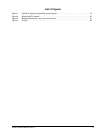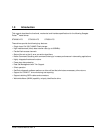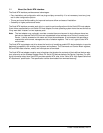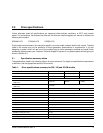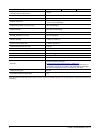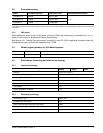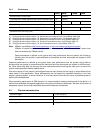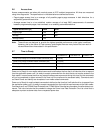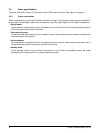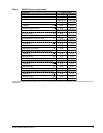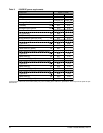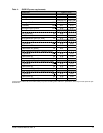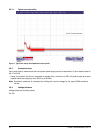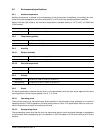
6 Pulsar Product Manual, Rev. A
2.4.3 Performance
Notes 200GB 100GB 50GB
Maximum Burst Transfer Rate 300MB/s
Peak sequential 128KB read/write data transfer rate (MB/s max) [1] 240/220
Sustained sequential 128KB read/write dat
a transfer rate (MB/s) [2] 200/100 200/60 200/30
Peak 4KB random read/write command rate (IOPs) [3] 30,000/25,000
Sustained 4KB random read/write command rate (IOPs) [4] 25,000/5200 25,000/2600
Sustainable 4KB Random combined IOPS for 5 year Endurance
(65%/35% R/W, 70% Duty Cycle)
[5] 10,500
[1] Testing performed at Queue Depth = 32, Sequentially Preconditioned drive, using IOMeter 2008.6.28.
[2] Testing performed at Queue Depth = 32, Sequentially Preconditioned drive, using IOMeter 2006.7.27.
[3] Testing performed at Queue Depth = 32, Randomly
Preconditioned drive, using IOMeter 2008.6.28.
[4] Testing performed at Queue Depth = 32, Randomly Preconditioned drive, using IOMeter 2006.7.27.
[5] Testing performed at Queue Depth = 32, Non-Preconditioned drive, using IOMeter 2006.7.27.
Note. IOMeter is available at http://www.iometer.org/ or http://sourceforge.net/projects/iometer/.
IOMeter is licensed under the Intel Open Source Licen
se and the GNU General Public License. Intel
does not endorse any IOMeter results.
Peak performance is defined as the typical best case performance
that the product will be able to
achieve when the product is preconditioned as mentioned and host commands are aligned on 4KB
boundaries.
Sustained performance is defined as the typical worst case
performance that the product will be able to
achieve when the product is preconditioned as mentioned and host commands are aligned on 4KB boundar-
ies. Write values also take into account the worst case performance throttling that may occur to ensure the
product meets specified reliability specifications.
Due to the nature of Flash memory technologies there are many factors that can result in values different than
those stated in this specification. Some discrepancies can be caused by bandwidth limitations in the host
adapter, operating system, or driver limitations. It is not the intent of this manual to cover all possible causes of
performance discrepancies.
When evaluating performance of SSD devices, it is recommended to measure performance of the device in a
method that resembles the targeted application using real world data and workloads. Test time should also be
adequately large to ensure that sustainable metrics and measures are obtained.
2.5 Physical characteristics
Maximum height 7.0 mm (0.276 in)
Maximum width 70.1 mm (2.76 in)
Maximum length 100.53 mm (3.958 in)
Max weight 135 g (0.298 lb)




